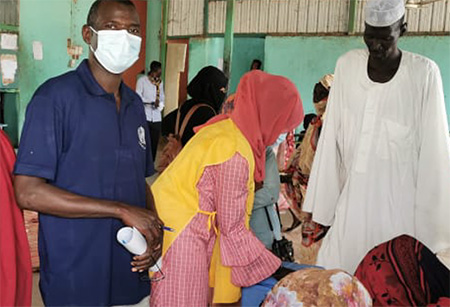 Sudan faces multiple health challenges. Approximately 94% of the country’s people are not vaccinated against COVID-19, and its case-fatality ratio of 7.69% is among the highest in the Eastern Mediterranean Region. Simultaneously, it is confronting outbreaks of other communicable diseases such as dengue fever, malaria and hepatitis E. And a military coup in October 2021 added further uncertainty and complexity.
Sudan faces multiple health challenges. Approximately 94% of the country’s people are not vaccinated against COVID-19, and its case-fatality ratio of 7.69% is among the highest in the Eastern Mediterranean Region. Simultaneously, it is confronting outbreaks of other communicable diseases such as dengue fever, malaria and hepatitis E. And a military coup in October 2021 added further uncertainty and complexity.
While working with stakeholders to tackle these challenges, the country office in Sudan needed additional assistance to deal with essential administrative tasks towards the end of the biennium, including the closure of incumbrances and donor reporting.
It was an opportunity for Amna Al-Kilidar, Administrative Officer at the WHO country office in Yemen, to step in at the request of her operations office and Dr Adham Abdel Moneim, WHO Representative to Yemen.
Drawing on her experience gained from the emergency in Yemen, Amna was tasked with leading the operations team to process operational funding and assist in implementing audit recommendations.
The exposure of one office to another other adds to the individual in seeing a different context, a different approach to solving things, a different challenge, and a different management style
United for global health
Dr Adham was keen to arrange the surge support. He believes strongly that exchanges between staff members reduce silos within the Organization and make the aim of one WHO a reality. The Organization has more than 250 staff in Yemen, tackling a complex, protracted emergency situation, so there is a deep reservoir of expertise.
Gaining experience in dealing with other country offices, governments and entities is something to exemplify as a norm
He also notes that surge placements can provide a great platform for staff members to develop their careers.
Overcoming hurdles
The surge support was initiated as a way of providing additional hands to fill gaps in administrative capacity and exchange experiences. Dr Nima Abid, WHO Representative to Sudan, says the presence of a colleague from another country office aided their emergency response. It came at a crucial moment, helping to prevent the loss of precious funds through the timely submission of reports and the termination of purchase orders to conserve resources for Sudan.
Surge support builds the capacity of WHO personnel, especially national staff, by exposing them to international experience and promotes the culture of one WHO
The complex situation in Sudan made COVID-19 vaccination particularly challenging, and the available vaccines were expected to expire by mid-October and mid-January. However, the WHO country office resorted to direct implementation due to the coup and was able to successfully vaccinate 700 000 people by November 2021. As a result, Sudan’s vaccination rate increased and donors were satisfied.
A backbone during an emergency
Working during the coup could be stressful at times, and Amna notes the importance of maintaining a work-life balance. Communicating with her family through several calls proved crucial help, though this was complicated by a temporary communication blackout. She also found it useful to meditate during stressful moments, walk around the block and make time for entertainment.


